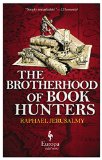Summary | Excerpt | Reviews | Beyond the Book | Readalikes | Genres & Themes | Author Bio

Critics' Opinion:
Readers' Opinion:
First Published:
Nov 2014, 256 pages
Paperback:
Nov 2014, 256 pages
 Book Reviewed by:
Book Reviewed by:
Davida Chazan
Buy This Book
THE BROTHERHOOD OF BOOK HUNTERS
The poet François Villon has been condemned to death by Louis XI, and to escape execution, he enters into a questionable relationship with a bishop in the pay of Louis XI. All Villon has to do to earn his freedom is to convince a printer and bookseller to move from Mayence to Paris, telling him that by doing so he'll be better able to circulate progressive ideas that aren't approved of in Rome. But, not surprisingly, Villon's task is not as simple as it sounds.
Excerpt from Chapter Three:
The Bishop of Paris crossed the street, cursing and grumbling, hopping to avoid the puddles. Two hooded clerics trotted beside him, trying in vain to protect him from the rain beneath a canvas canopy that the wind twisted and shook in all directions. The gutters of Rue Saint-Jacques carried mire and refuse, which the disgusted prelate prodded away with his episcopal crozier. Johann Fust rushed to open the door of his new shop while his son-in-law, Pierre Schoeffer, a brush in his hand, held himself ready to clean the mud-spattered miter.
As soon as he entered, Chartier held his nose. A rough smell of ink and sweat made him retch. Fust stopped the banging of mallets and ordered his workers to be silent. François Villon stood with his elbows on a hand-press, smiling wickedly as he observed the bishop's authoritarian expression, Fust's obsequious gestures, the distressed faces of the apprentices. It was as if each of these people were trying very hard to conform to the character they had been assigned.
Schoeffer kissed His Excellency's ring and, without further ado, proudly launched on a guided tour of the printing works. Guillaume Chartier resolved to follow his host amid the maze of machines and piles of paper, listening to the explanations with only half an ear. The printers stood stiffly, their caps held tight in their hands. Once the tour was over, the bishop blessed the premises with a hasty sign of the cross while one of his clerics energetically waved a big brass censer. Beaming with pride, Schoeffer handed Chartier the very first book printed in Paris, in the year of grace 1463, by permission of the King. He declared pompously that this was the cornerstone of an edifice that would enlighten the world as much as the lighthouse of Alexandria, spreading the glory of France among the nations. Unmoved, Chartier put the book down negligently on a workbench all sticky with birdlime.
François felt a certain bitterness at seeing the bishop dispose of the ceremony so casually. An event of such importance deserved a special effort of protocol. Angrily, he walked to the back of the room, where the presses were at rest. There were twelve in all, arranged in two parallel rows that François walked along slowly as if inspecting the troops. Massive, made of a heavy, robust wood, bristling with levers covered in grease, they exuded a disturbing power. They were solidly nailed to a platform to avoid any shifting during the printing process. This raised position made them as imposing as statues of Roman emperors. François sensed the hold they might have on men in the future. They were also a little like him, docile in appearance, giving the impression of being easy to handle. But also like him, they could not limit themselves to serving a Fust or a Chartier, to being merely the instrument of their ambitions, political or financial, their pitiful plans. There was too much strength in them for these people to keep them to themselves, to confine them in a prison or a shop. François suddenly saw in these presses a possible ally. For him, and for poetry. They reminded him of the horses he had stolen, opening their enclosure in the middle of the night, taming their spirit, disciplining their trembling muscles, riding them into the dark woods, ever faster, ever further. Were these machines also capable of kicking and snorting?
Excerpted from The Brotherhood of Book Hunters by Raphael Jerusalmy. Copyright © 2014 by Raphael Jeruslamy. Excerpted by permission of Europa Editions. All rights reserved. No part of this excerpt may be reproduced or reprinted without permission in writing from the publisher.





The House on Biscayne Bay
by Chanel Cleeton
As death stalks a gothic mansion in Miami, the lives of two women intertwine as the past and present collide.

The Flower Sisters
by Michelle Collins Anderson
From the new Fannie Flagg of the Ozarks, a richly-woven story of family, forgiveness, and reinvention.

The Funeral Cryer by Wenyan Lu
Debut novelist Wenyan Lu brings us this witty yet profound story about one woman's midlife reawakening in contemporary rural China.
Your guide toexceptional books
BookBrowse seeks out and recommends the best in contemporary fiction and nonfiction—books that not only engage and entertain but also deepen our understanding of ourselves and the world around us.